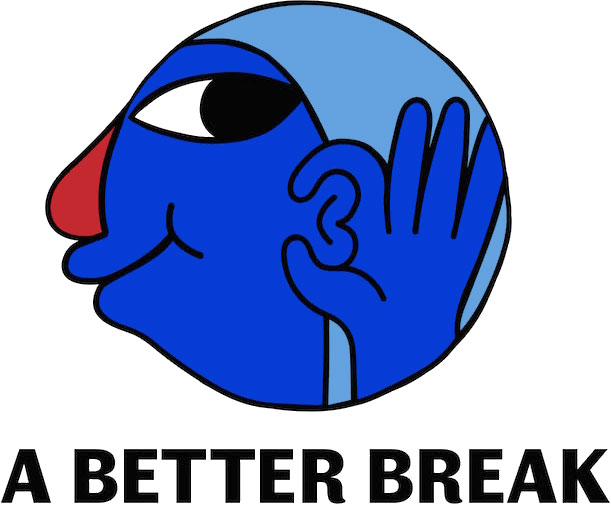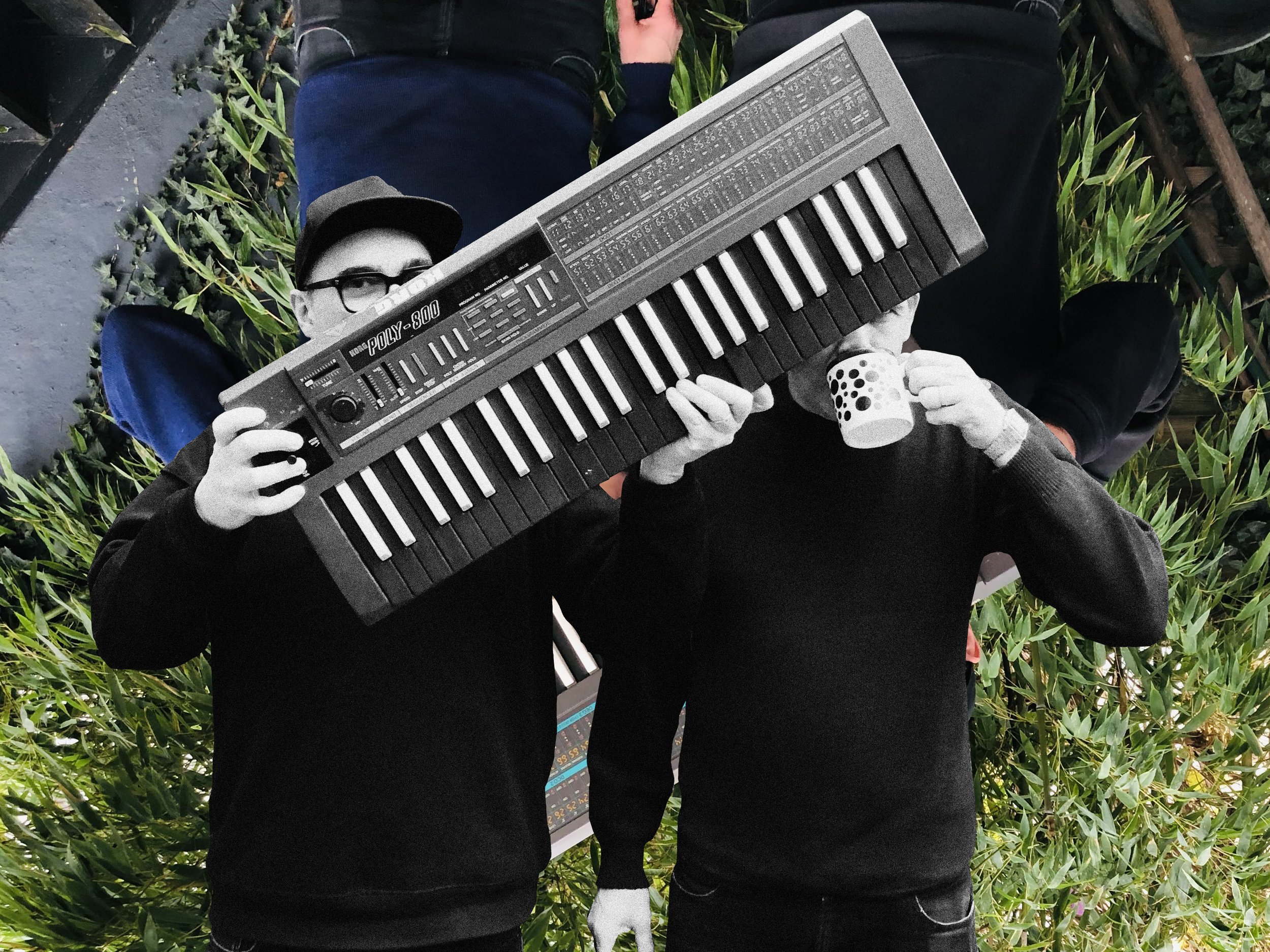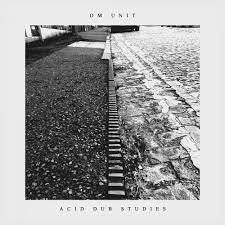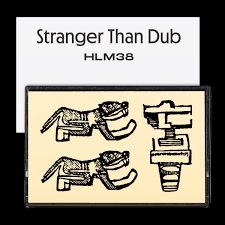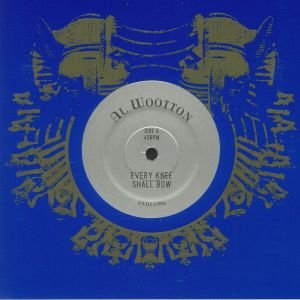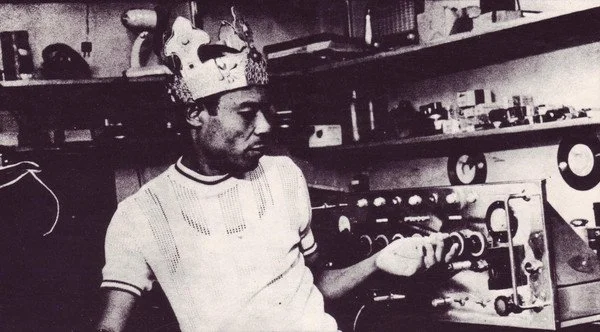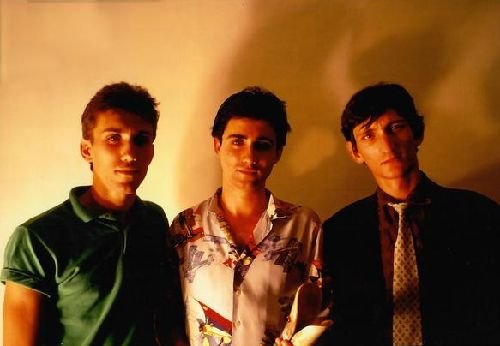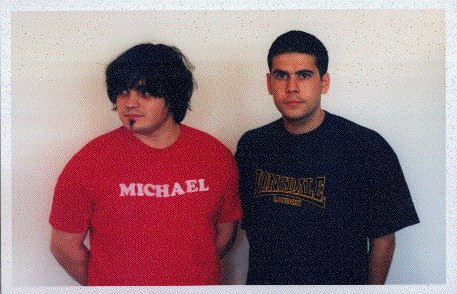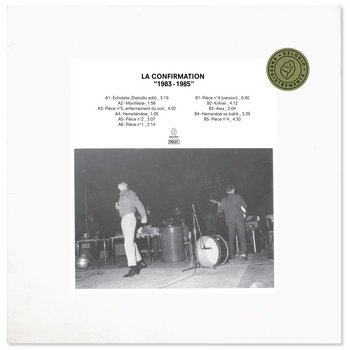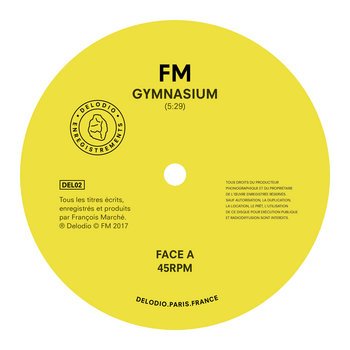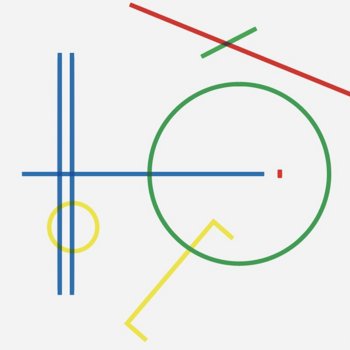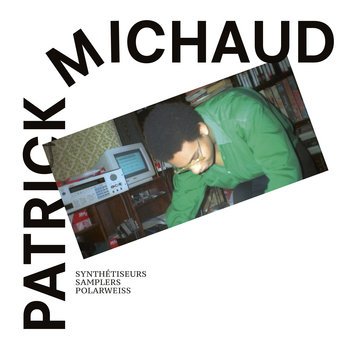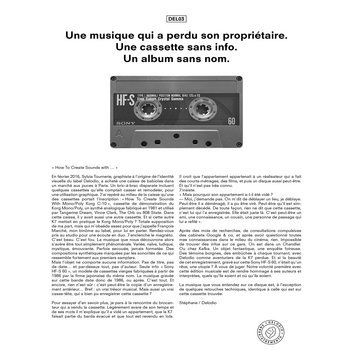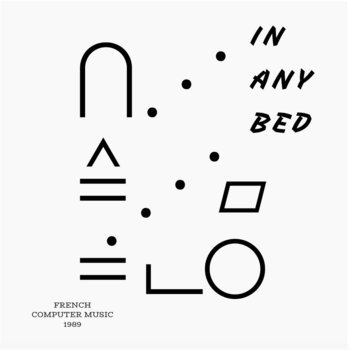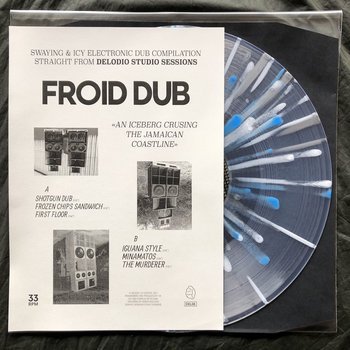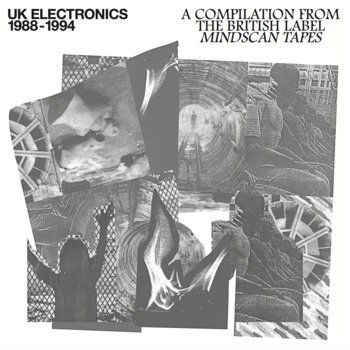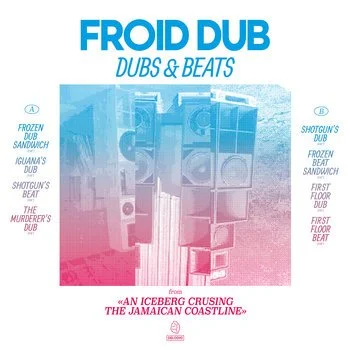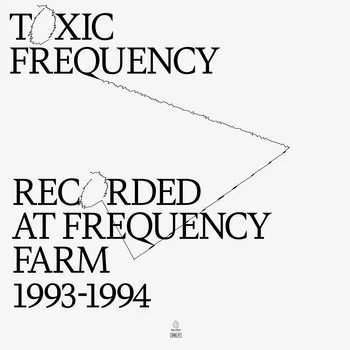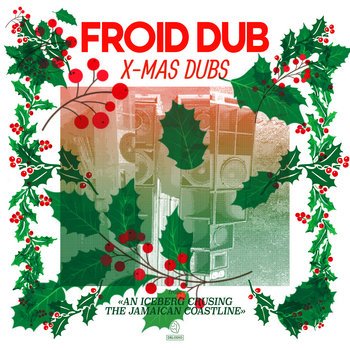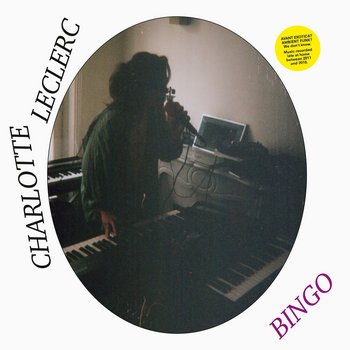FROID DUB: COLD GETTIN' DUBBED!
The cold dubbers: Stéphane Bodin (Fafane) and François Marché (FM)
Professing to be the sound of an iceberg cruising the Jamaican coastline the whacked out digi-dub experiments of Froid Dub have stood out as some of the best of the current crop of productions that sip from the cup of dub. Here Spice Route profiles the two veteran producers behind the project as well as their gloriously idiosyncratic label Delodio.
Dub is like a long echo delay, looping through time. Regenerating every few years, sometimes so quiet that only a disciple could hear, sometimes shatteringly loud, dub unpicks music in the commercial sphere. Spreading out a song or a groove over a vast landscape of peaks and deep trenches, extending hooks and beats to vanishing point, dub creates new maps: sound sculptures, sacred sites, balm and shock for mind, body and spirit. David Toop defines Dub in Mixmag (December 1992)
Much of this years Dub and Reggae chart compiled by the Wire’s resident Dub sage Steve Barker contains, to paraphrase him slightly, music operating at the periphery of the orthodox core of these genres; tracks by the likes of Al Wootton and Om Unit typify a year of widespread dalliance with dub; where a subverted dubwise methodology has been applied with wild abandon to non-reggae sound material and reflects, according to Barker, a prevalent production modus operandi- one that dwells in ‘abstract, tangential and referential zones’.
2021 is not the first year for such iterations of dub and reggae to be produced — indeed ever since the first innovative mixing board adventures in Trenchtown started to filter their way in to the minds of other non-reggae producers the dub contagion has taken ahold and woven itself in to the DNA of a plethora of musical styles. However as Toop’s quote above attests there are moments where the spectral influence of dub loom large and others where the presence is more subtly felt.
In 2021 it feels very much as if dub influence is very much in a period of feast rather than famine but previous years have also been plentiful suggesting we are part way in to a period of healthy resurgence. Indeed the trend was well under way a few years ago when Oli Warwicks’s comprehensive and insightful survey of the leftfield dub scene “Dubbing is a Must: The modern sound of leftfield dub” in 2018 for Fact perfectly refracted the ethos of many boutique labels at the time who were looking to “build on the dub template and push it into unusual places”. The best quote within the article comes from Jahtari’s Jan Gleimar who stoically reflected on his own relationship to dub music as follows…
“When you listen to those old Jamaican records you’re hearing something that was magic on that island and that period,” says Gleichmar. “But I’m not living in Jamaica. I’m living in a rainy industrial place and the world is changing. I have kids now so my concern is not in the past, in some mystical place where I haven’t even been. I want to capture the feeling of now….”
Fast forward 4 years and you’ll find that a similar kind of pragmatism is also at the heart of how Fafane and FM from Froid Dub, one of a current crop of French acts subverting the dub mindset, view their own position to the creation of their particular brand of whacked out dub and electro hybridism. For them dub has been a long held passion but they have never been concerned to slavishly reproduce the music of Scientist, Tubby or Perry. Indeed for Fafane such premeditation when it comes to making music is unnecessary pretence,
“If you want that extra soul that makes music rise higher than an assembly of notes, sounds and rhythms, it must be played, you must have fun, surprise yourself, let the music take you by surprise and don’t think of it all as a communication event. Music first, communication after.”
Music First
This is not empty verbiage either, the idea of letting the music take the centre stage and the communication to act as a secondary impulse has been borne out through the 10 releases (soon to be 11) released so far on Delodio, the label that Fafane and FM run jointly out of Paris. Using the slightly tongue in cheek but very apt motto ONE FOOT ON THE DANCE FLOOR, ONE FOOT IN A TRASH CAN the pair have released a steady flow of music that defies neat and orderly categorisation, showing the quixotic verve of a label run with passion and not profit fuelling decisions.
Before rushing to a synopsis of the fabulously eclectic Delodio back catalogue a bit of pre-history of the label owners will serve us well.
With a small town mentality, you make a decision very early on as to whether you are going to do everything by the book or just go your own way and not care. Bjork
For Stéphane Bodin (aka Fafane) and François Marché (aka FM) their town of origin was Niort situated in Nouvelle Aquitaine region of Western France. Whilst not a small town it is not a particularly dazzling city in terms of it’s culture and instead it holds the slightly more drab honour of being France’s capital of mutual insurance. Therefore early on in their lives both Fafane and FM learned to live both with and beyond the cultural confines of their town.
In Fafane’s words….
“It was a chance to grow up in this kind of town. Not too small, not too big. It helps not to mess around too much when you like drinking and partying like us when we lived there.”
For Fafane and FM Niort was the place where they made a lifelong friendship and where they first bonded over music establishing a connection with each other whilst at a gig for local experimental mavericks Ptose, a band that became the basic impulse for their subsequent musical endeavours.
Throughout their near decade long existence Ptose typified and galvanised the independent DIY experimental scene within France and indeed further afield thanks to their imprint Ptôse Production Présente, an independent label on which they released, between 1980 and 1984, fifteen tapes adorned with such beautifully crass titles as Perfumed Flowers on the Lake of Piss. Drawing considerable influence from the freefrom avant garde and anti-Major spirit of the Residents Ptose managed to deliver a healthy message of non-conformity to the young minds of Fafane and FM, a clarion call to create and distribute which eventually lead to them picking up some samplers and keyboards and forming Bosco in the early 90s.
By now living in Paris Fafane and FM’s basic impulse to experiment resulted in Bosco being one of the more adventurous acts to put a French Touch to the electronica scene that boomed in the late 90s thanks to the rise of the superstar DJ. Signed to the free-spirited home of weirdo electronica and broken pop Platinum Records the pair released three albums and ten singles as Bosco. Drawing from a disparate array of influences the pair created music that grooved and surprised in equal measure.
It seemed that the spirit of adventure instilled in them by Ptose drove Fafane and FM towards a more abstract form of sampling and songwriting. Where other dance producers of the era fed their samplers saccharine loops designed for maximum smiley face nihilism Bosco dared towards more imaginative Akai bricolage concocting their own form of musical cubism where sounds remained in a perpetual state of oddly pleasing (un)familiarity.
After Bosco stopped releasing music the pair worked on a variety of projects both together (Blackmail, PANTI WILL, Prototypes) and individually (Hématome, Newell) that kept them busy for over a decade either performing live or in the producers chairs at their Team Bosco studio in Paris. Veering from indie rock to full blow electro the pair have retained the creative impulse instilled in them at early Ptose shows to excite, surprise and to never yield to complacency. Their boundless open-mindedness led them collaborate with Hedi Slimane for Dior Homme, make music with Fred Schneider of The B 52's, produce an album for Volt on the cult american label In The Red, participate in global campaigns for brands like APPLE and select playlists for the parisian Art Deco temple La Samaritaine. As a duo their capacity for reinvention and appetite for new projects is staggering.
And so it was in 2016 the pair found themselves in possession of a shoebox of unreleased material from Ptose affiliates La Confirmation and on hearing the material decided to set up the Delodio label. Fafane explains, “We set up the label to release these songs, without any other specific ideas. But, records are a bit like tattoos, once you’ve done one, you want to do another …”
This one record begets another mentality meant that the archival industrial experiments of La Confirmation then made way for some new recordings from FM. The Gymnasium 12" paid homage to the rave sounds that had piqued Marché’s ears as a youngster with energetic 808 workouts on each side of the single redolent of orbital raves and bomber jackets.
Next came two archival releases that truly encapsulated the trash to treasure spirit of Delodio’s ethos. The first a compilation of short electronic vignettes from Patrick Michaud, a hitherto unknown electronic musician, whose wild fairlight experiments come on like the more exotic electro experiments one could find on the Koka Media libraries. The other is release plucked quite literally from obscurity —a cassette tape from an untraceable author unearthed by the labels graphic designer, Sylvia Tournerie, in a box of assorted junk from a thrift-store in Paris. Despite valiant attempts to detect the provenance the mysterious producer behind the curious but majestic sequenced electronic sketches on the tape the mysterious composer was never found. No charming Hollywood ending to the story simply a deadend with some fantastic music playing in the corridors.
Slightly easier to trace were the authors behind the next two releases rescued from the trash for release on Delodio, the first being a 7" featuring two previously unreleased bedroom compositions from Fafane’s past. Recorded in 1989 by Fafane and his friend Fabrice on an Amiga 500 the primitive but ultimately beguiling electro and synth-pop showcased on the In Any Bed single spoke the same musical language as the Michaud and Sampling Puzzle releases. The second release stood in more of a contrast to what had preceded it, but was equally as charming to listen to.
Winsome and slightly introspective bedroom demos recorded recorded late at home by Charlotte Leclerc between 2011 and 2018 were labelled somewhat hopefully as both avant exotica and ambient funk in the press release. The interplay between the gently pulsing rhythm computer backings, wafts of gentle hand played percussion and guitar/bass overdubs and blankets of angular synth it is hard to pigeonhole Leclerc’s music other than to assume that these were products of a mind allowed to drift in full surrender to itself.
The only two questions we ask ourselves before releasing a reference are, “Is this good ?” “. “Would I buy it ? » If the answer is still yes after a few weeks, or months or years, we start to organize a release.
2021 saw the label dig yet again in to the history bin to find more electronic obscurities. UK Electronics 1988–1994 compiled the best from the now defunct UK casette label Mindscan Tapes run by Robert Maycock. The release celebrates the halcyon pre-internet days of musical discovery and communication with Mindscan being typical of the DIY network of tape distributors, releasing whatever they wanted and disseminating their products via a pleasingly arcane route of mailing lists, flyers and word of mouth. Not a banner ad in site.
Dub’s “fragmenting of the song surface ” has become one of the stylistic cornerstones of popular dance music in the digital age, and its fluid reinterpretation of song form laid an important foundation for the amorphous remix culture that is so central to contemporary pop music” Michael E. Veal Dub: Soundscapes And Shattered Songs In Jamaican Reggae
Sandwiching the Mindscan compilation were the first two releases from the aforementioned Froid Dub project. For some labels this may seem like a slightly disjointed sequence but if we consider Veal’s sentiments above it comes as a logical step for Delodio to embrace the fluid and fragmented songcraft of dub and subvert it for their own ends. For both Fafane and FM dub had been a long admired artform. Fafane’s exposure to dub music came via the seminal Lee Perry Arkology boxset copped from a friend of his Father whilst for FM the Scientist Dub LP proved a damascene moment that connected dub to the soundsystem culture of early strains of UK bass music.
Whilst long admired as an artform it was recent personal environmental pressures that lead Fafane to reconvene more closely with dub…..
I work in a bar that plays a lot of rock, n’roll, often at very loud volumes and my head is often completely full of saturated and invading frequencies. Few years ago, when I got home I started to listen to more and more music with a lot of air and space to clear my head, and no longer put any noisy records on the turntable,. It was at this point that there were more and more Dub records played in the house. Music with plenty of room, plenty of air that give space to bass frequencies and personal reflection.
With dub serving as much needed headbalm for Fafane it seemed opportune timing that FM had a bunch of tracks in development stage that immediately seemed to appeal to Fafane’s rekindled to dub. Explaining the mixing process Fafane states that “we tried to mix these songs differently to see what it would be like to push versions in other directions”.
The results of this process made for truly captivating material. On the first mini-LP “An iceberg cruising the Jamaican coastline” FMs six spartan rhythm tracks straddle perfectly the kind of glacial DIY synth-wave previously released on the label and a mutant tundra-born strain of heavily synthesised dancehall instrumental, something akin to Mafia & Fluxy being allowed in to Klaus Schulze’s studio for a jam. Froid Dub’s music is operating exactly in those ‘abstract, tangential and referential zones’ of dub music that Steve Barker reported on in his dub rundown.
6 months later the pair released “Dubs & Beats From An Iceberg Crusing The Jamaican Coastline” that took the original material and put in into even more sparse and icy territories as Fafane and FM took the stems back to the mixing board. The skeletal rhythmic structures were eroded to reveal their funky quintessence, basslines were bounced and realigned and toplines were fractalised and dissolved. A few months later they even found the time to make a set of special festive dubs, replete with sleigh bells!
Some projects sometimes take several years to take shape, it’s like wine. We have plenty of material and projects stored in our music cellar that are maturing.
2022 has already seen the release of another release from the musical cellar. A compilation of hitherto unreleased demos recorded by Mark Crumby nee Rumbae as Toxic Frequency in the early 90s. Known as a key node in the DIY experimental and industrial music scenes thanks to his role as publisher of the highly influential Impulse magazine, owner of Jara Discs and latterly as a member of the Konstruvtivists collective as well as a producer of some clout in his own right under a plethora of pseudonyms. Never destined for release these tracks sat on Crumby’s shelf for years and may have never been released had it not been for Delodio’s intervention, a fact neatly surmised by Fafane’s view of the label’s raison d’etre.
This is why with Delodio we really like to put out music that was not recorded to be on a disc, but rather music that was played and stopped in time by the record button.
Reflecting back on Toop’s view of dub’s influence as “like a long echo delay, looping through time” may give more insight into the above sentiments from Fafane. Good dub music makes one feel like the notions of time and space are being interfered with, expanded upon and recalibrated. By being able to delve in to the of forgotten demo piles of musicians and being able to release them alongside new music Delodio is really showing itself to capture the essence of dubs power to disrupt and reconfigure chronology. Rather like the appearance of an iceberg on the Jamaican coastline Delodio take delight in creating an alternative history set in place only by their standards of good music.
https://delodiolabel.bandcamp.com/
https://www.instagram.com/delodio___/
https://soundcloud.com/delodio-label/
Read the full interview with Fafane and FM below……>>>>>>>>>>>>>>>>>>>>>>>>>>>>>>>>>>>>>>>>>>>>>>>>>>>>>>>>>>>>>>>>>>>>>>>>>>>>>>>>>>>>>>
Froid Dub is you (Stéphane Bodin aka Fafane) and François Marché aka FM. How did the project start between you two ?
F.M. came up one day with a bunch of songs he had made that worked well together but he wasn’t sure what to do with. When he played the tracks at the studio, I immediately wanted them to be released on Delodio on vinyl, I thought it was great and I wanted us to share it. I proposed to find a framework to wrap this music. I brought in the name FROID DUB, which was supposed to make you understand the spirit of the songs very quickly, and I suggested focusing the visual on the disk object. No cover art, no image, just a record and a infos sheet. Sylvia Tournerie graphic designer and third head of the label has brought a visual in this direction. We have known each other for a very long time and often operate that way. We tried to mix these songs differently to see what it would be like to push versions in other directions. We found it cool and decided on a whim (which is not at all in our nature …) to assemble them together and release them on record under the name “Dubs & Beats”. Very quickly we started to wanting to know how could that sound as a live version. The next step was assemble a set of machines and run some sound. We move day by day trying not to disperse and by each referring to the opinion of the other. I think we can say that FM is the soul, the referent of Froid dub, Fafane is the soul, the referent of the label.
The Delodio label was founded in 2016 by you and FM. Why did you decide to start the label? Was it because you had the La Confirmation material you wanted to release?
We had known La Confirmation since the 80’s, but we didn’t know if there were any recordings other than the one released on a Spanish compilation. We found and contacted Nicolas Bourriaud and Christophe Duchatelet ( 2 founding members ) to ask them the question. After several months of research, they returned us a shoe box full of rehearsal tapes, concerts and 4-track recordings. Listening to these tapes, we said to ourselves that we had to make a selection and put it out on record, otherwise this music was going to disappear with these tapes. We set up the label to release these songs, without any other specific ideas. But, records are a bit like tattoos, once you’ve done one, you want to do another …
The label is a mixture of archive material and newer material. Will it always be like that? Do you have lots more archive material to release?
We have no plan. We try to take our time to make sure every reference we release is essential. We follow Elvis’s adage: “Take Care of Business in a flash”. Each release takes a lot of time, energy and money, you really have to be sure that is important. Some projects sometimes take several years to take shape, it’s like wine. We have plenty of material and projects stored in our music cellar that are maturing. The only two questions we ask ourselves before releasing a reference are, “Is this good ?” “. “Would I buy it ? » If the answer is still yes after a few weeks, or months or years, we start to organize a release.
The Froid Dub project is an amazing mix of electro and dub. I think of John Carpenter and Prince Jammy on holiday at the Compass Point Studios together. What sort of influences help you make the music ?
I think you shouldn’t start a project and saying to yourself, I’m going to do : John Carpenter + Prince Jammy + Compass Point Studios = it’s going to be great !! If you start like this, the result will not exceed the sum of the elements. That’s my opinion. If you want that extra soul that makes music rise higher than an assembly of notes, sounds and rhythms, it must be played, you must have fun, surprise yourself, let the music takes you by surprise and doesn’t think of it all as a communication event. Music first, communication after. This is why with Delodio we really like to put out music that was not recorded to be on a disc, but rather music that was played and stopped in time by the record button. As is the case with the music of Charlotte Leclerc and Patrick Michaud that we released on the label. There is a freshness and a sincerity that goes beyond all imaginable musical combinations. Having said that, John Carpenter, Prince Jammy and Compass Point Studios are 3 references that we really like a lot. 😊
What are your backgrounds? I’m aware that you and François were both born in Niort and grew up together and then formed Bosco. How was life growing up in Niort ?
We are like a kind of family now. We were at the same college, playing music in my bedroom and now our teenagers sons play video game together. It was a chance to grow up in this kind of city. Not to small, not to big. It helps not to mess around to much when you like drinking and partying like us when we lived there. But, it was a long time ago, we’re now living in Paris for more than 30 years.
Why does the dub production style appeal to you? When were you first exposed to dub? And also what was your first exposure to electronic music?
( Fafane ) I work in a bar that plays a lot of rock, n’roll, often at very loud volumes and my head is often completely full of saturated and invading frequencies. Few years ago, when I got home I started to listen to more and more music with a lot of air and space to clear my head, and no longer put any noisy records on the turntable,. It was at this point that there were more and more Dub records played in the house. Music with plenty of room, plenty of air that give space to bass frequencies and personal reflection. I like Dub because everything works the opposite way to the rest of the music making. A song is never finished, everyone in the chain has as much importance, from musicians to producer to DJ. And it’s subtraction music, which is built by taking away, not adding. I like that. One of the first dub record Ilistened to a lot was the Lee Perry « Arkology » in 1997. A friend of my father’s had this CD box in duplicate, he gave me one. I still have it.
(F.M) My first encounter with dub was in 90/91 with the purchase of the Scientist reissue “Scientific Dub”, it connected me with the jungle and all English bass music in general. Here in France, dub and D’n’B / jungle are fairly cataloged as a music for crusty bare foot people.
(Fafane) In 1976, there was a radio program named “maximum de musique” on Europe1, a very famous French national station. The opening title was “radioactivity” by Kraftwerk, which for the time was something completely crazy. My father listened to this radio station all day long . I remember that every time the show started and the sound of this song echoed through our kitchen, it was as if Odysseus’ sirens would sing. Time stood still. I was completely fascinated and sucked in by these synthetic sounds. At the beginning of the eighties the first pieces of 808 electro hip hop came with the break dance wave. We were both quite touched by the sound of this rhythm box. A few years later a friend came to my house with the 12 ″of Blue Monday from New Order, it changed my life. I remember exactly where I was and the effect it had on me.
(FM) I clearly remember listening to Blue Monday once in a club in Germany in 1984, it was a blast, this kick playing loud in the speakers was an experience. But at the same period, i was listening in loop « Looking for the perfect beat « Afrika Bambaataa and « Wild Style » Time Zone, i’ve heard those tracks in a french T.V show called « H.I.P H.O.P ». I started a promising but very short career as break dancer ;-)
What are some of your favourite artists making music at the moment ?
Paranoid London, Spaced Out Krew, Tôle Froide, Front de Cadeaux, Sun In Capricorn.
Do you have any producers or musicians who are your idols?
Martin Hannett, Afrika Bambaataa, King Tubby, Mad Mike / UR, Spacemen 3, New Order, Chris & Cosey, ESG, Aphex Twin
